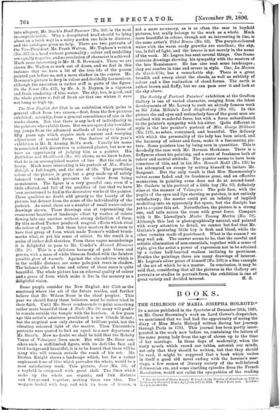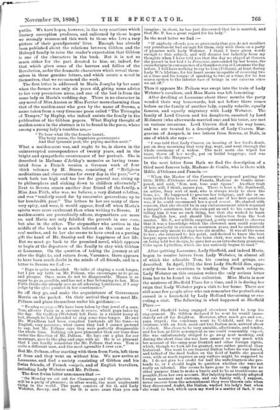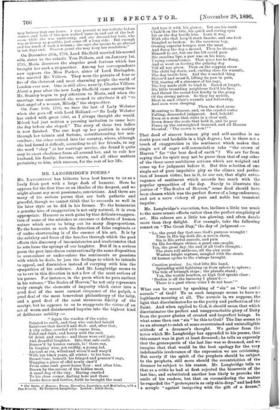BOOKS.
THE GIRLHOOD OF MARIA JOSEPHA HOLROYD.* IN a notice published in the Spectator of December 26th, 1885, on Mr. Oscar Browning's work on Lord Gower's despatches, we mentioned that we bad had the opportunity of seeing the' diary of Miss Maria Holroyd written daring her journey through Paris in 1791. This journal has been partly incor- porated in the work now before us, containing the letters of the same young lady from the age of eleven up to the time of her marriage. In these days of modernity, when the nasty novels which crowd our tables, astonish our minds, not only that they should be written, but that they should be read, it might be supposed that a book which unites- in itself a good old novel ending with the heroine's mar- riage, a few scenes of literary society of the well-beloved Johnsonian era, and some startling episodes from the French. Revolution, would not enlist the sympathies of the reading
• The Girlhood of Maria Josepha droyd (Lady Stanley Alderley), as Told in Letters of a Hundred Years An front InS to 1796. With, 6 Port suts. LoLdon 1.43 maw and Co.
public. We have hopes, however, in the very reactions which literary corruption produces, and enlivened by those hopes we strongly recommend this work to those who love a racy picture of their grandparents' lives. Enough has already been published about the relations between Gibbon and the Holroyd family to raise the reader's expectation that Gibbon is one of the characters in the book. Bat it is not so much either for the part devoted to him, or, indeed, for that which gives some of the horrors and follies of the Revolution, as for the dramatic characters which reveal them- selves in these genuine letters, and which create a novel in themselves, that we recommend the work.
The first letter is addressed to Maria Joseph& by her aunt when the former was only six years old, giving some advice to her very precocious niece, and one of the last is from the same lady on Maria's wedding-day. There is no character in any novel of Miss Austen or Miss Ferrier more charming than that of the maiden-aunt who goes by the name of Serena, a name taken from a very tiresome poem called "The Triumphs of Temper," by Hayley, who indeed assists the family in the publication of the Gibbon papers. What Hayley thought of maiden-aunts in the abstract is to be found in the poem, where among a young lady's troubles are,—
" To bear what ills the female haunt,
The testy nurse, the imperious gouvernante And that tyrannic pest, the prying maiden-aunt."
What a maiden-aunt was, and ought to be, is shown in the uninterrupted correspondence of twenty years, and in the bright and sympathetic countenance of her portrait. She is described in Madame d'Arblay's memoirs as having trans- lated from a French version a German work of four thick volumes by M. Storm, consisting of "Religions meditations and observations for every day in the year,"—" a work both too high and too low for general use, rising up to philosophers and sinking down to children alternately."
Next to Serena comes another dear friend of the family, a Miss Ann Firth, who was, we believe, a very distant relation, and was "tenderly cared for by successive generations up to her hundredth year." The letters to her are many of them very spicy, and were, it would appear, fired off when Maria's -spirits were more exuberant than when writing to Serena. If maiden-aunts are proverbially odious, stepmothers are more so, and Maria not only falsified the proverb in one case, but also in the other. The stepmother who arrives in the middle of the book is as much beloved as the aunt or the real mother, and to her she seems to have owed as a parting gift the hand of Mr. Stanley and the happiness of her life.
But we must go back to the promised novel, which appears to begin at the departure of the family to stay with Gibbon at Lausanne. On the question of taking the journey at all
after the flight to, and return from, Varennes, there appears to have been much doubt in the minds of all friends, and in a letter to Serena we fiad :— "Papa is quite undecided. He talks of staying a week longer, but I pin my faith on Mr. Pelham, who encourages us to go on and prosper. Once more do not be disagreeable. Mama is as eager to go as possible, and has not a fear belonging to her. Miss Firth thinks she already sees us all adorning Lanthorns, if I may judge by the effroi painted in her countenance."
So off they go, and make the acquaintance of Gouverneur Morris on the packet. On their arrival they soon meet Mr. Pelham and place themselves under his guidance:— "Tuesday evening.—We have been taken by that jewel of a man, Tom, all over Paris in a carrosse de remise, which papa takes by the day. Sir Godfrey (Webster) left Paris in a violent hurry at last, though he had intended to stay some time longer. He and Mr. Wyndham had been compleat husbands all the time—in English, very perverse ; what cause they had I cannot pretend to say, but Mr. Pelham says they were perfectly disagreeable the whole time. Nothing can pass pleasanter than our time does under the direction of Mr. Pelham. He lays out a plan for our mornings, goes to the play and sups with us. He is so pleasant that I can hardly remember the Mr. Pelham that was. Tom is quite a different man, and the most agreeable I ever saw."
But Mr. Pelham, after starting with them from Paris, left them
at Sens and they went on without him. We now arrive at Lausanne, and find a society consisting of Gibbon and his Swiss friends, of French emigres, and of English travellers, including Lady Webster and Mr. Pelham. The first Swiss letter announces that On Monday we set out for Chamouny and the glaciers. It will be a patty of pleasure ; in other words, the most unpleasant thing in the world. The party consists of Sir G. and Lady Webster, Sea-cry, and us. Sir G. is more cross than you can imagine ; in short, he has just discovered that he is married, and that Mr. P. has a great regard for his lady."
In the next letter we find :—
"If anybody offends you so grievously that you do not recollect any punishment bad enough for them, only wish them on a party of pleasure with Lady Webster. I think I have given words enough to this subject, and will dismiss her ladyship from my thoughts when I have told you that the day we stayed at Geneva she passed in her bed a is Franeaise, surrounded by her beaux, the cause fatigue in consequence of a thunderstorm at Lausanne the day before. I will have nothing to say to him (Pelham), at least during Lady W.'s lifetime, for his heart seems incapable of receiving two at a time and his tongue of speaking to two at a time, for he has scarce spoken to the inferior race of beings in our caravan since we set off."
Thus it appears Mr. Peiham was swept into the train of Lady Webster's cavaliers, and Miss Maria was left lamenting.
After dwelling at Lausanne about three months the party wended their way homewards, but not before there comes before us the family of another lady, equally volatile, equally famous, and equally migratory with Lady Webster. The family of Lord Craven and his daughters, escorted by Lord Molineux (who afterwards married one) and his tutor, are met on various occasions. Lord Craven died on his way home, and we are treated to a description of Lady Craven, Mar- gravine of Anspach, in two letters from Serena, at Bath, in
one of which she says :—
"I was told that Lady Craven, on hearing of her lord's death, put on deep mourning that very day, wept, and went through the whole ceremony of a widow. The next morn she wiped her tears, threw off her wee.lds, put on bridal trappings, and was married to the Margrave."
In the next letter from Bath we find the description of a third most famous lady, Madame de Geniis, who is there with Mdlle. d'Orleans and Pamela :— " When the Master of the Ceremonies proposed putting the little Mdlle. d'Orleans above Pamela, Madame de Genlis inter- posed, and said, Non, non, thus sont egaux! Another trait of hers will, I think, amuse you. There is here a Mr. Southwell, an active, busy sort of man, who is always ready to show the lions, &c. He happened to procure her lodgings, and she in re- turn invited him to tea. He went, and one of her first questions was, if he could recommend her a good arocat. He started with concern, that she should be in any embarrassment which required a lawyer's assistance, but she soon put an end to his concern by telling him it was no such thing, but that she wished to learn the English law, and should like instruction from the best master. Mr. S., not a little surprised, gently ventured to observe that it was a knowledge which the cleverest men could scarcely obtain per:ectly in sixteen or seventeen years, and he understood Madame only meant to stay here six months. It was all the same to her ; she returned to her point, and desired to know the best lawyer, upon which Jeffries, the town clerk, was sent to her, and on being told her design, he gave her as an introductory grammar, Coke upon Lyttelton, which she has seriously begun to read."
After quitting Lausanne, Lady Sheffield, and indeed Maria, began to receive letters from Lady Webster, in almost all of which the adorable Tom, his coming and goings, are described. In April, 1792, the first Lady Sheffield dies, appa- rently from her exertions in tending the French refugees. Lady Webster on this occasion writes the only serious letter from her to be found in this collection. Miss Maria is now the mistress of Sheffield Place for a time, and it is during her reign that Lady Webster pays a visit to her home. There are still some few people alive who can remember the perturbation caused in a household by Lady Holland threatening or exe- cuting a visit. The following is what happened at Sheffield
Place :-
"Lord Sheffield being engaged elsewhere tried to keep his engagement. Mr. Gibbon declared if he went he would imme- diately set off for Brighton. However, after much pro and con., papa stayed ; the coachman went to Uckfield, and the dear creature, with an Irish maid and two Italian men, arrived about 5 o'clock. She chose to be very amiable, affectionate, and tender, and for her, as little nonsensical as one could reasonably expect. She was unfortunately obliged to go away next morning, and during the short time she was here amused us very much with her account of the camp near Dunkirk and other foreign sights, which, though we took all for granted, were rather poetical than historical. She went to see General Dalton before he was buried, and talked of the dead bodies on the field of battle she passed over, with as much rapture as any vulture might be supposed to do. I do not give her credit for half the unfeelingness she pre- tends to, or I should begin to question whether she were not really an infernal. She seems to have gone to the camp for no other purpose than to make a bustle and to be as troublesome as possible,from her own account. Her ladyship has entirely adopted foreign manners and customs, and our family will, I suppose, never recover from the astonishment they were thrown into when they discovered Andre, the Italian, washed his lady's feet when she went to bed, which upon my word is a matter of fact, if one may believe that one hears. I was present at her toilette before dinner, and both of the men walked tame in and out of the bed. room while she was undressing, and one dressed her hair, who was as frowsy as possible, just come off a long ride. But enough and too much of such a woman ; she says she means to go abroad in ten days end. Heaven grant she may keep her resolution."
On December '26th, 1794, Lord Sheffield married his second wife, sister to the volatile Tom Pelham, and on January 1st, 1795, Maria discovers the singular good fortune which has brought her such a stepmother. Among her correspondents now appears the Miss Parker, sister of Lord Boringdon, who married Mr. Villiers. They were the parents of four or five of the cleverest and most charming people the world of London ever saw. One is still alive, namely, Charles Villiers.
About a year after the new Lady Sheffield came among them
Mr. Stanley began to pay attention to Maria, and when the marriage was announced she seemed to attribute it all "to that angel of a woman, Milady," the stepmother. On June 10th, 1796, we hear the last of Lady Webster when she goes off with Lord Holland :—" So Lady Webster has ended with great eclat, as I always thought she would. Milord had just written a Dressing invitation to come here the day before she eloped." The story of these two ladies is now finished. The one kept up her position in society through her talents and fortune, notwithstanding her mis- conduct ; the other retired into the country, where, although she had found it difficult, according to all her friends, to say the word "obey "at her marriage service, she found it quite easy to exact obedience from all around her, and to rule her husband, his family, fortune, estate, and all other matters pertaining to him, with success, for the rest of her life.












































 Previous page
Previous page